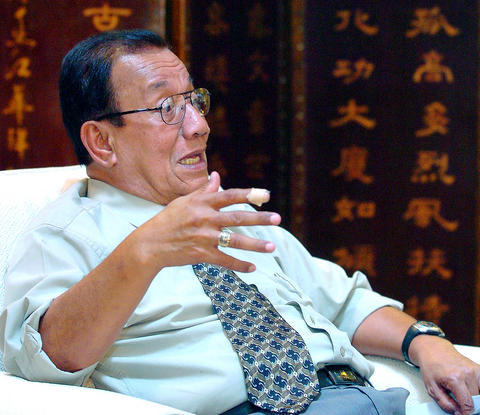The Marshall Islands and Taiwan will enjoy a strong friendship for many decades to come, the leader of the Pacific island country said on Tuesday, touting the close relationship between the nations since the establishment of diplomatic ties 10 years ago.
Marshal Islands President Litokwa Tomeing, visiting Taiwan for the first time as the president, affirmed that Taiwan-Marshall Islands relations remain firm.
"Taiwan has made many valuable and practical contributions to the people of the Marshall Islands. The relations between the two nations will only grow stronger for the next decade or more," he said in an interview with the Taipei Times.

PHOTO: LIAO CHEN HUEI, TAIWAN TIMES
Ties were called in question late last year when Tomeing won the seat after staunch pro-China rhetoric during his campaign.
The former speaker was quoted last November as saying the Marshall Islands had "wronged China" by recognizing Taiwan in 1998 and that he planned to adopt a "one China" policy once in office.
Taiwan quickly reacted by accusing Beijing of injecting large sums of money to sway the election.
But so far both the Ministry of Foreign Affairs and Majuro have stressed that relations between the two countries are stable.
The relationship was further buttressed in January when Vice President Annette Lu (
Since establishing relations with the country in 1998, Taiwan has become Majuro's second largest donor -- behind the US -- by providing an annual financial package of US$10 million.
Taiwan also provides humanitarian assistance in the form of medical and agricultural missions.
When asked how he plans to strike a balance between the pro-China and pro-Taiwan voices in his government, he simply said that the Marshall Islands has an "open-door policy" to welcome all those who seek the country's friendship.
"The country has no enemies," Tomeing said.
He added that he believes cross-strait problems should remain solely between Taiwan and China.
"We support Taiwan because it is a democratic country. The Republic of the Marshall Islands government has confidence that the two countries will reach a mutual understanding," he said, adding that "only time can tell" when and how the issue will be resolved.
Tomeing said he believed that Taiwan could increase its pool of friends in the Pacific by continuing to display its goodwill.
"So long as Taiwan continues to demonstrate its strength in terms of goodwill toward Pacific allies, the world will see its friendly gesture," he said.
"Eventually, the nations that are not in Taiwan's corner will see the advantage of recognizing Taiwan as an independent country," he said.

The Ministry of Economic Affairs has fined Taobao NT$1.2 million (US$36,912) for advertisements that exceed its approved business scope, requiring the Chinese e-commerce platform to make corrections in the first half of this year or its license may be revoked. Lawmakers have called for stricter enforcement of Chinese e-commerce platforms and measures to prevent China from laundering its goods through Taiwan in response to US President Donald Trump’s heavy tariffs on China. The Legislative Yuan’s Finance Committee met today to discuss policies to prevent China from dumping goods in Taiwan, inviting government agencies to report. Democratic Progressive Party Legislator Kuo Kuo-wen (郭國文) said

The Ministry of Economic Affairs has fined Taobao NT$1.2 million (US$36,900) for advertisements that exceeded its approved business scope and ordered the Chinese e-commerce platform to make corrections in the first half of this year or its license would be revoked. Lawmakers have called for stricter supervision of Chinese e-commerce platforms and more stringent measures to prevent China from laundering its goods through Taiwan as US President Donald Trump’s administration cracks down on origin laundering. The legislature’s Finance Committee yesterday met to discuss policies to prevent China from dumping goods in Taiwan, inviting government agencies to report on the matter. Democratic Progressive Party

Taiwan and its Pacific ally Tuvalu on Tuesday signed two accords aimed at facilitating bilateral cooperation on labor affairs, according to Taiwan’s Ministry of Foreign Affairs (MOFA). The governments inked two agreements in Taipei, witnessed by Foreign Minister Lin Chia-lung (林佳龍) and visiting Deputy Tuvaluan Prime Minister Panapasi Nelesone, MOFA said in a news release. According to MOFA, the agreements will facilitate cooperation on labor issues and allow the two sides to mutually recognize seafarers’ certificates and related training. Taiwan would also continue to collaborate with Tuvalu across various fields to promote economic prosperity as well as the well-being of their

Sung Chien-liang (宋建樑), who led efforts to recall Democratic Progressive Party (DPP) Legislator Lee Kun-cheng (李坤城), was released on bail of NT$80,000 today amid outcry over his decision to wear a Nazi armband to questioning the night before. Sung arrived at the New Taipei District Prosecutors’ Office for questioning in a recall petition forgery case last night wearing a red armband bearing a swastika, carrying a copy of Adolf Hitler’s Mein Kampf and giving a Nazi salute. Sung left the building at 1:15am without the armband and covering the book with his coat. Lee said today that this is a serious